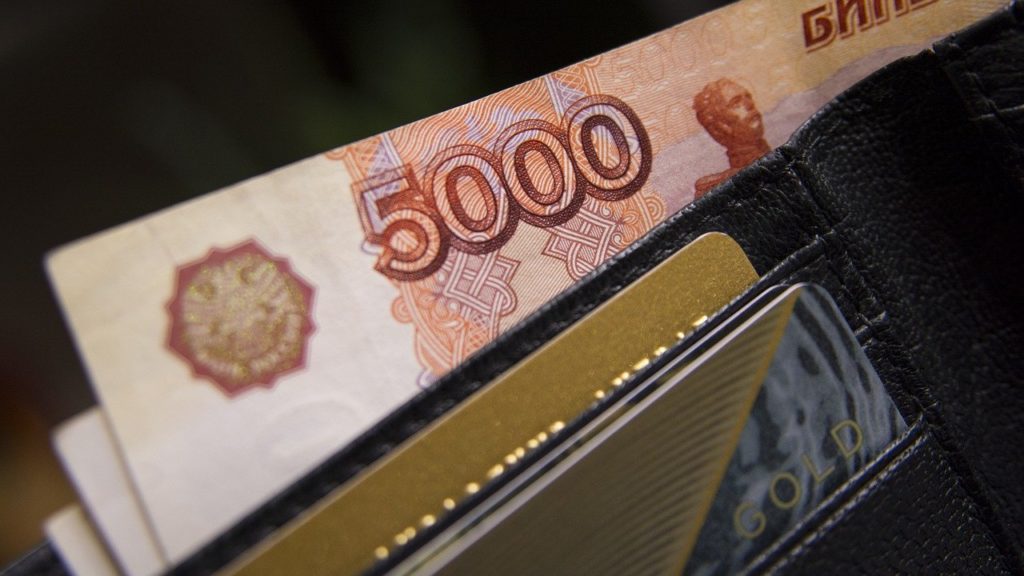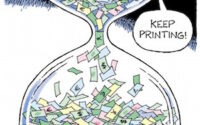Peter Schiff: Sanctions on Russia Could Mean Even Higher Inflation for Americans

President Joe Biden has announced the first round of economic sanctions on Russia as tensions in Ukraine continue to mount. The sanctions came in response to an announcement by Russian President Vladimir Putin recognizing two breakaway republics in Ukraine and his decision to send troops into those regions.
Sanctions are meant to punish Russia, but in his podcast, Peter Schiff explained how these economic moves could also impact the US dollar and create even more inflation.
The first tranche of sanctions against Russia will target Russian banks and sovereign debt.
“Today, I am announcing the first tranche of sanctions to impose a cost on Russia in response to their actions yesterday,” Biden said. “We’ll continue to escalate sanctions if Russia escalates. We are implementing full blocking sanctions on two large Russian financial institutions VEB and military bank. We are implementing comprehensive sanctions on Russia’s sovereign debt. That means we’ve cut off Russia’s government from Western financing,”
Biden said the US will also impose sanctions on Russia’s elites and family members.
Interestingly, this is one of the reasons the Russians have been engaged in de-dollarization for several years. They were fearful that the US would use the dollar as a foreign policy club. In June 2021, Russia announced plans to completely eliminate dollars and dollar-denominated assets from its sovereign wealth fund. This was part of an intentional “de-dollarization” policy outlined by President Putin to lower the country’s exposure to the United States and shield it from the threat of US sanctions.
Before ending its purchase program at the onset of the COVID pandemic, Russia was the biggest central bank buyer of gold. The Central Bank of Russia bought $4.3 billion worth of the yellow metal between June 2019 and June 2020. And the Russians were buying gold long before that. The Central Bank of Russia bought gold every month from March 2015. According to Bloomberg, “Russia spent more than $40 billion building a war chest of gold over the past five years, making it the world’s biggest buyer.”
Meanwhile, the Russian central bank was aggressively divesting itself of US Treasuries. Russia sold off nearly half of its US debt in April 2018 alone, dumping $47.4 billion of its $96.1 billion in US Treasuries.
Peter pointed out that other countries are watching how the US uses its privilege of issuing the world’s reserve currency.
China is looking on thinking, well, Russia is doing something America doesn’t want. They’re getting sanctioned. What if we do something that America doesn’t want? We get sanctioned. They pull the dollar out from under us. Let’s get out from under the dollar on our own. Let’s not leave this weapon in the hands of the US that can be turned against us at any time.”
This could create a significant problem for the United State. The dollar remains the reserve currency because countries like China warehouse dollars as a reserve asset. This props up the value of the dollar.
This scares a lot of the world into recognizing that they have entrusted the US with a power that could be misused against them. And I think this type of situation is going to hasten the demise of the dollar’s status as the reserve currency.”
But Americans could feel more immediate impacts from these sanctions. Biden conceded they could drive the price of oil even higher. But then the president promised that he wouldn’t let these sanctions hurt average Americans or the US economy. Peter asked the operative question: how can he do that?
He can’t, at least not honestly. He’s going to pretend. Because obviously, what Biden is going to do is he is going to take some action to try to mitigate the harm on consumers from higher energy prices, higher gasoline prices, higher heating oil prices. However Americans access energy, they’re going to be paying more for it as a result of these sanctions.”
Of course, we were already paying more due to inflation. Now, Biden wants to insulate consumers from the impact of rising energy costs. We’ve already heard the idea of a gas tax holiday floated. But as Peter pointed out, whatever the US government does to shield you from higher energy prices will come at a cost. It will raise the federal budget deficit even higher.
If the government finds a way to offset higher energy prices by giving Americans money, either by lowering the tax that they were imposing on gas or finding a way to send credits to American consumers that they could use to pay gas prices, or maybe to reimburse the oil companies or gasoline stations to sell their oil at a loss so that the American consumer doesn’t have to feel the higher price — whatever the US government does, whatever scheme they come up with … Americans are going to pay higher prices for everything else.”
The only way to pay for this offset is by creating inflation. The US government will have to run larger deficits. And the Fed will have to monetize this debt. In effect, that means more money printing. And that is, by definition, inflation.
And if the Fed doesn’t monetize the debt, that will just put more upward pressure on interest rates.
As Peter explained, in effect, you might pay less for gas, but other prices will rise.
The government has no ability to deliver anything. All they can do is rearrange the deck chairs on the Titanic. You’re going to get nothing from government. Whatever they put in your right pocket is something they took from your left pocket. But here’s the problem. When the government picks your pocket and gives you back the money, you don’t get it all because they keep some for themselves.”
The bottom line is that anything the Biden administration does to ease the pain caused by these sanctions will end up inflicting even more pain someplace else.
In this podcast, Peter also talks about the NATO alliance, the impact of these geopolitical tensions on the markets, bitcoin and Hex Coin.

Call 1-888-GOLD-160 and speak with a Precious Metals Specialist today!
[ad_2]
Source link


